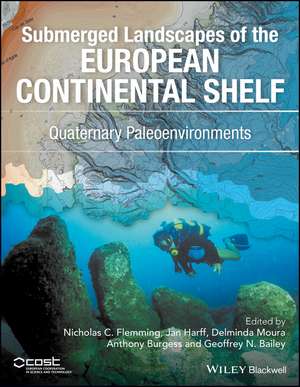Quaternary Paleoenvironments – Submerged Landscapes of the European Continental Shelf.
Autor G Baileyen Limba Engleză Hardback – 29 iun 2017
Preț: 551.42 lei
Preț vechi: 755.13 lei
-27% Nou
Puncte Express: 827
Preț estimativ în valută:
105.63€ • 111.78$ • 87.49£
105.63€ • 111.78$ • 87.49£
Carte indisponibilă temporar
Doresc să fiu notificat când acest titlu va fi disponibil:
Se trimite...
Preluare comenzi: 021 569.72.76
Specificații
ISBN-13: 9781118922132
ISBN-10: 1118922131
Pagini: 552
Dimensiuni: 217 x 284 x 32 mm
Greutate: 1.72 kg
Editura: Wiley
Locul publicării:Chichester, United Kingdom
ISBN-10: 1118922131
Pagini: 552
Dimensiuni: 217 x 284 x 32 mm
Greutate: 1.72 kg
Editura: Wiley
Locul publicării:Chichester, United Kingdom
Public țintă
Primary market: Advanced students, researchers in Quaternary science (this includes a wide variety of specialisms such as sedimentology, paleontology, geomorphology etc) and in archaeology. Reaching both these markets is critical for the success of this project. The market covers the whole of Europe (including the Mediterranean) and the maritime near Middle East and North Africa. However it should be noted that much of the science is applicable outside Europe, particularly in North America and AustralasiaSecondary market: Although the book is aimed at researchers, it should quickly establish its unique coverage of a previously obscure topic, and hence become useful at an advanced undergraduate level. A further readership will probably be in submerged archaeological site conservation and heritage management.
Cuprins
Notă biografică
Nicholas C. Flemming has studied submerged terrestrial archaeological sites and changes of sea level for more than 50 years, and is the author of several books and papers on the subject. He is a Visiting Research Fellow at the National Oceanography Centre, Southampton, a Fellow of the Society of Antiquaries of London, a Fellow of the Society for Underwater Technology, and a Vice-President of the Nautical Archaeology Society.
Jan Harff is Professor of Geosciences and Seafloor Geology at the University of Szczecin, Poland. He collaborates with marine research institutes in the Baltic area and Scandinavia, Russia, the United States and China. He coordinated (together with Friedrich Lüth) the research project SINCOS (Sinking Coasts - Geosphere, Ecosphere and Anthroposphere of the Holocene Southern Baltic Sea), and chaired Working Group 2 ("Environmental Data and Reconstruction") of the COST Action TD0902: SPLASHCOS.
Delminda Moura is a geologist at the Universidade do Algarve- Centre for Marine and Environmental Research (CIMA), Portugal, conducting research on landscape evolution during the Quaternary, as forced by climatic and sea-level changes. She devotes particular attention to the use of morphological, sedimentological and biological proxies to reconstruct past sea levels.
Anthony Burgess graduated in 1996 from the University of Wales (Swansea), and then joined the Home Office, working as a crime analyst until 2008. After leaving the Home Office and enjoying an extended period of travel, he completed his masters in maritime archaeology at the University of Southampton, and is currently a PhD candidate in Archaeology at the University of Malta.
Geoffrey N. Bailey is Anniversary Professor of Archaeology in the University of York, and Chairman of the EU-funded SPLASHCOS programme. His research interests are in coastal prehistory, submerged landscapes and Quaternary-scale environmental change, and he has engaged in major projects on these themes in Australia, Africa, Greece, Saudi Arabia and the UK, most recently as Principal Investigator of the European Research Council DISPERSE Project, concerned with the role of geologically unstable landscapes and coastal environments in patterns of early human dispersal in Africa, the Red Sea and the Arabian Peninsula. He is a Fellow of the Society of Antiquaries of London, a member of Academia Europaea, and President of the UISPP Commission on Coastal Prehistory and Submerged Landscapes.
Descriere
Quaternary Paleoenvironments examines the drowned landscapes exposed as extensive and attractive territory for prehistoric human settlement during the Ice Ages of the Pleistocene, when sea levels dropped to 120m-135m below their current levels.
